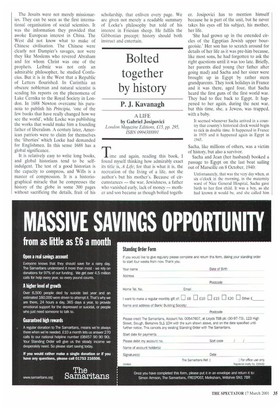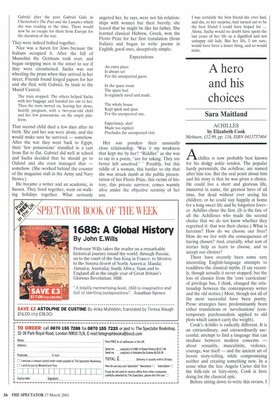Bolted together by history
P. J. Kavanagh
A LIFE by Gabriel kisipovici London Magazine Editions, £15, pp. 295, ISBN 0904388891 Time and again, reading this book, I found myself thinking how admirably exact its title is, A Life; for that is what it is, the recreation of the living of a life, not the author's but his mother's. Because of circumstances — the war, Jewishness, a father who vanished early, lack of money — mother and son became as though bolted togeth
er. Josipovici has to mention himself because he is part of the unit, but he never takes his eyes off his subject, his mother, her life.
'She had grown up in the extended circles of the Egyptian Jewish upper bourgeoisie.' Her son has to scratch around for details of her life as it was pre-him because, like most sons, he had forgotten to ask the right questions until it was too late. Briefly, her parents died young (her father after going mad) and Sacha and her sister were brought up in Egypt by rather stern grandparents. They took holidays in France and it was there, aged four, that Sacha heard the first guns of the first world war. They had to flee back to Egypt. It happened to her again, during the next war, but this time, she, a Jewess, was trapped, with a baby.
It seemed whenever Sacha arrived in a country that country's historical clock would begin to tick in double time. It happened in France in 1935 and it happened again in Egypt in 1945.
Sacha, like millions of others, was a victim of history, but also a survivor.
Sacha and Jean (her husband) booked a passage to Egypt on the last boat sailing out of Marseille on 8 October. 1940:
Unfortunately, that was the very day when, at six o'clock in the morning, in the maternity ward of Nice General Hospital, Sacha gave birth to her first child. It was a boy, as she had known it would be, and she called him
Gabriel after the poet Gabriel Gale in Chesterton's The Poet and the Lunatics which she was reading at the time There would now be no escape for them from Europe for the duration of the war.
They were indeed bolted together.
Nice was a haven for Jews because the Italians occupied it. After the fall of Mussolini the Germans took over, and began stripping men in the street to see if they were circumcised. Sacha was out wheeling the pram when they arrived in her street. Friends found forged papers for her and she fled, with Gabriel, by train to the Massif Central.
The train stopped. The others helped Sacha with her baggage and handed me out to her. Then the train moved on, leaving her alone, heavily pregnant, with a two-year-old child and her few possessions, on the empty platform.
That second child died a few days after its birth. She and her son were alone, and she would make sure he survived — somehow. After the war they went back to Egypt, their `few possessions' trundled in a cart from flat to flat. Gabriel did well at school and Sacha decided that he should go to Oxford and she even managed that — somehow. (She worked behind the counter of the magazine stall in the Army and Navy Stores.)
He became a writer and an academic, in Sussex. They lived together, went on walking holidays together. What seriously angered her, he says, were not his relationships with women but their brevity; she feared that he might be like his father. She learned classical Hebrew, Greek, won the Florio Prize for her first translation (from Italian) and began to write poems in English; good ones, deceptively simple: Expectations
An extra place Is always set For the unexpected guest.
In the spare room The spare bed Is regularly aired and made, The whole house Kept spick and span For the unexpected one.
Expectancy, alas! Made too explicit Precludes the unexpected visit.
Her son ponders their unusually close relationship. 'Was it my weakness that kept me by her? "Riddles" as she was to say in a poem, "are for asking. They are better left unsolved." ' Possibly, but this riddle of a woman, this battler so shy that she was struck dumb at the public presentation of her Florio Prize, this victim of history, this private survivor, comes warmly alive under the objective scrutiny of her son.
I was certainly the best friend she ever had, and she, to her surprise, had turned out to be the best friend I could have hoped for ... Alone, Sacha would no doubt have spent the last years of her life as a dignified and not unhappy old lady. But her life, I am sure, would have been a lesser thing, and so would mine.



































































 Previous page
Previous page